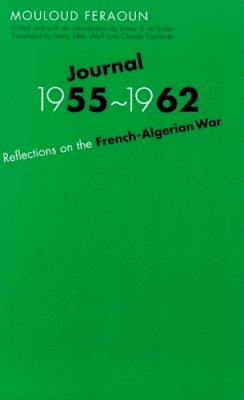
Journal, 1955-1962: Reflections on the French-Algerian War
Mouloud Feraoun
However, not even the gunmen of the OAS could prevent Feraoun’s journal from being published. Journal, 1955–1962 appeared posthumously in French in 1962 and remains the single most important account of everyday life in Algeria during decolonization.
Feraoun was one of Algeria’s leading writers. He was a friend of Albert Camus, Emmanuel Roblès, Pierre Bourdieu, and other French and North African intellectuals. A committed teacher, he had dedicated his life to preparing Algeria’s youth for a better future. As a Muslim and Kabyle writer, his reflections on the war in Algeria afford penetrating insights into the nuances of Algerian nationalism, as well as into complex aspects of intellectual, colonial, and national identity. Feraoun’s Journal captures the heartbreak of a writer profoundly aware of the social and political turmoil of the time. This classic account, now available in English, should be read by anyone interested in the history of European colonialism and the tragedies of contemporary Algeria.
Product Details
About Mouloud Feraoun
Reviews for Journal, 1955-1962: Reflections on the French-Algerian War
and proof that he had a better grasp of the meaning of his country's history than did most commentators in Paris and elsewhere. Keeping his journal, moreover, was an act of courage: people where arrested and killed for less overt expressions of sympathy for the rebellion... [Feraoun and Camus] both learned French with the simplicity and the clarity that characterize that language's best prose: they are the kinds of writers who seem, when you first encounter them, easy to read, and turn out to be far more difficult to understand. They always say much more than you thought they said. This is, of course, one definition of classical literature; and both Camus, who won the Nobel Prize for Literature in 1957, and Feraoun, who is probably the most widely-read French-language Algerian writer of the century (after Camus), were part of the French canon by the late 1950s... Tersely and eloquently, Feraoun summed up in the pages of his journal the injustice of the colonial system, but unlike the Paris intellectuals he did not dwell upon it, preferring to keep notes on what actually happened to actual people with whom he was acquainted... Feraoun's journal became one of the most important books to emerge from the Algerian conflict. It is an essential human document, a real war book... The Algerian war ... remains an unavoidable reference point in the debate over the kind of world we will live in. And this debate was foreshadowed in Feraoun's journal, as in the polemical writings of Camus and Amrouche. For this reason, the publication of this English translation of Feraoun's Journal is very welcome."-New Republic New Republic "Feraoun's painfully candid yet engaging journal of the French-Algerian War constitutes an unusually poignant record of one of Africa's cruelest colonial conflicts and one of twentieth-century France's darkest moments. Journal, 1955-1962 will surely supplant Frantz Fanon as the definitive text on French Algeria in particular and on colonialism in general."-Julia Clancy-Smith, author of Rebel and Saint: Muslim Notables, Populist Protest, Colonial Encounters (Algeria and Tunisia, 1800-1904)
Julia Clancy-Smith
